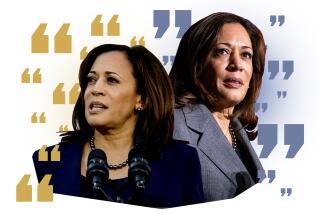Kagan opposed military stance on gays
Reporting from Washington — A controversy over military recruiting at Harvard Law School while Elena Kagan was dean may say less about her views on the military than it does about her strong belief in equal rights for gays and lesbians, one of the foremost unsettled issues before the Supreme Court.
In a series of memos to the faculty and students, Kagan described the military’s policy of excluding openly gay men and women as “a profound wrong — a moral injustice of the first order.”
“It is a wrong that tears at the fabric of our own community because some of our members cannot, while others can, devote their professional careers to their country,” she wrote in 2003, shortly after becoming dean.
By contrast, “the Law School remains committed to the principle of equal opportunity for all persons, without discrimination on the basis of sexual orientation,” she said.
It marks one of the few times during her career in which she voiced a strong and deeply held view on a matter of legal controversy. It is also one of the issues sure to come before the high court in the years ahead.
The Constitution guarantees all people “equal protection of the laws,” but the Supreme Court has not ruled squarely on whether official discrimination based on a person’s sexual orientation violates the equal-protection clause. In 2003, the court struck down a Texas law that made private sex between gays a crime, but it did so by ruling that law violated the rights to liberty and privacy.
The justices could be forced to rule on the equal-protection issue if California’s ban on gay marriage is struck down by a lower court. Or the same issue could arise in state cases over adoptions, child custody or public benefits for same-sex couples. It is also possible the court could agree to hear a constitutional challenge to the military’s “don’t ask, don’t tell” policy that was adopted by Congress.
Kagan’s words suggest she may lean in favor of at least some of those challenges, though last year she responded to a question from senators by saying, “There is no federal constitutional right to same-sex marriage.”
Since her nomination this week, Kagan’s personal life as an unmarried woman has been a topic of discussion in some quarters, even as Republicans and Democrats have said it is not relevant to her confirmation. In response to questions, the White House said she is not a lesbian, and friends have come forward to say she is a heterosexual.
In 2002, the year before Kagan became dean, Harvard Law School joined others around the country in agreeing to give military recruiters full access to students through the campus Office of Career Services.
Prior to that time, Harvard had a compromise policy in place. Since 1979, most U.S. law schools said they would not permit employers to recruit at their schools if they discriminated based on race, gender, religion or sexual orientation.
Because Pentagon officials would not and could not sign a pledge saying they did not discriminate based on sexual orientation, they could not meet students in the campus placement office. However, students interested in the military could meet with military recruiters through the Harvard Law School Veterans Assn. elsewhere on campus. At other campuses, law students met military recruiters at the ROTC offices.
The Clinton administration viewed this compromise approach as acceptable. But in December 2001, the Bush administration told law schools they were violating the Solomon Amendment, a law that said school officials may not “prohibit or in effect prevent” military recruiting on campus, and that doing so could lead to a cutoff of federal funding for the entire university. Though Harvard, Yale, USC and other law schools maintained they were not violating the law, they agreed to the Pentagon’s demand.
Then-Harvard Law Dean Robert Clark told the faculty and students he saw “no reasonable alternative” to going along with the government’s order. In 2003, when Kagan became dean, she continued the policy of permitting military recruiters, while at the same time expressing “deep distress” at the exclusion of gay and lesbian students.
But when the U.S. 3rd Circuit Court of Appeals ruled the Pentagon’s policy unconstitutional, Kagan announced that the law school was returning to its former policy of forbidding military recruiters from using the school’s placement office.
Kagan and a group of Harvard professors signed a friend-of-the-court-brief in the case saying the school was not violating the Solomon Amendment because it was not preventing or prohibiting military recruiting.
The legal challenge ended in crushing defeat at the Supreme Court in 2006. In a unanimous decision, Chief Justice John G. Roberts Jr. upheld the Pentagon’s enforcement of the Solomon Amendment. The next day, Kagan sent an e-mail to the faculty and students saying she was disappointed by the decision but would permit military recruiters to use the placement office.
Her view remained unchanged, however. On Oct. 1, 2008, shortly before President Obama’s election and Kagan’s nomination as solicitor general, she sent a final e-mail to students and the faculty restating her view.
“I believe discrimination against gays and lesbians seeking to enter military service is wrong, both unwise and unjust.… I look forward to the time when all of our students can pursue any career path they desire, including the path — as deeply honorable as any I can imagine — of devoting their professional lives to the defense of this country,” she wrote.
More to Read
Get the L.A. Times Politics newsletter
Deeply reported insights into legislation, politics and policy from Sacramento, Washington and beyond. In your inbox three times per week.
You may occasionally receive promotional content from the Los Angeles Times.











